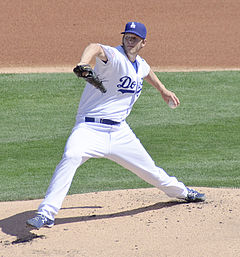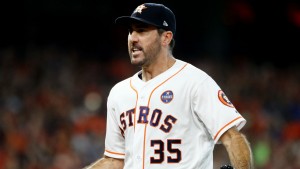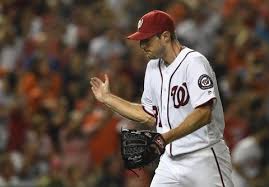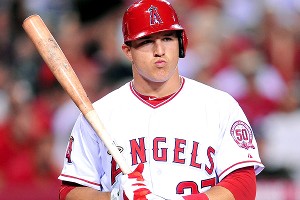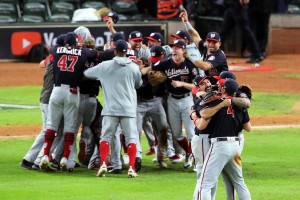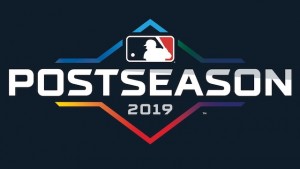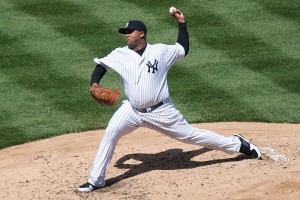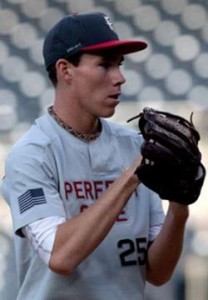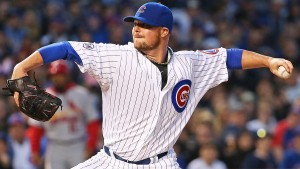
Lester: the best pitcher on the best rotation heading into 2019. photo via Grantland
I got out of the habit of doing this piece last year: right around this time in 2018 i was slammed at work, But, I found a bit of time earlier this off-season (thanks for Conference Calls) and put it together.
The core XLS is much more impressive than the text: here’s a Google version of it with the below data.
Here’s my 2019 Rotation ranks for every team in MLB, One to Thirty (1-30).
As I went through doing this, the ranks ended up naturally dividing into kind of natural groupings. So I’ll show these groupings and then do commentary on the group all together.
Terminology used here:
- to me an “Ace” is one of the best 15-20 starters in the game. I think i’ve got 18 identified heading into 2019. And yes, I count both Strasburg and Corbin as Aces for these purposes. I’ve seen plenty of op-eds claiming Strasburg isn’t an “Ace” for various reasons …. but he’s in the top 10-15 of practically every statistical measure of starters over the past 4-5 years. Just because someone is the #1 starter for a team does not make them an “Ace.”
- A “#2 starter” is then one of the next best 15-20 guys, players who either used to be Aces but have grown a bit old (good example: Jake Arrieta or Cole Hamels) or younger guys who are one more solid season from taking the next step up (Luis Severino, Mike Foltynewicz).
- A #3 starter is a level below the #2, the next 25-30 guys or so. A good solid mid-rotation starter. I have 30 identified.
- A #4 starter is basically slightly better than the #5 starter.
- A #5 starter is someone who gives replacement level starting pitching capabilities, a guy who is only slightly better than a 4-A guy. Often either a rookie or an aging FA signing.
In the XLS, i do assign quantitative values to assist in the rankings … so you can see who i call a 4, who’s getting a 5, etc.
OK lets get to it:
1. Chicago Cubs: Jon Lester, Kyle Hendricks,Cole Hamels, Yu Darvish, Jose Quintana
2. Boston: Chris Sale,David Price, Nathan Eovaldi, Rick Porcello, Eduardo Rodriguez
3. Cleveland: Corey Kluber, Carlos Carrasco, Trevor Bauer, Mike Clevinger, Shane Bieber
4. Washington: Max Scherzer, Patrick Corbin, Stephen Strasburg, Anibal Sanchez, Jeremy Hellickson
I have Chicago as the #1 rotation in the game. I have them at the top not so much because the top of their rotation is the best … its because man for man, 1 through 5, they’re the best. When your 4th starter is Yu Darvish, a guy who was the Cy Young runner up a few years back and is only 32 .. that’s a tough rotation. Quintana is the Cubs’ 5th starter but was the White Sox’ long time #2. Its just a lot of good, veteran pitching. Boston comes in slightly below b/c I rate Porcello/Rodriguez slightly lower than Chicago’s 4/5. Cleveland has a strong case (as does Washington) for having three legitimate Aces; if their #5 was better they’d probably be #1. If you wanted to argue that Washington is above or below the teams above them I wouldn’t argue too much; I look at the #4/#5 starters and say “who would you rather have?” And I find that i’d rather have Chicago’s arms on the back end than ours. I’d also note that we’ve had Scherzer now for four seasons; no real injuries … and Strasburg gets hurt literally every year. So Washington’s rotation really has to take into account its depth … or lack there of.
5. Los Angeles Dodgers: Clayton Kershaw ,Walker Buehler, Hyung-jin Ryu, Rich Hill, Kenta Maeda
6. New York Yankees: Luis Severino, James Paxton, Masahiro Tanaka, J.A. Happ, CC Sabathia
7. New York Mets: Jacob deGrom, Noah Syndergaard, Zach Wheeler, Steven Matz, Jason Vargas
8. Houston: Justin Verlander, Gerrit Cole, Wade Miley, Brad Peacock, Josh James
9. St. Louis: Miles Mikolas, Carlos Martinez, Jack Flaherty, Michael Wacha, Adam Wainwright
The Dodgers could jump to the next level if/when Walker Buehler turns into an Ace; i’ve still got him as a #2 but hope to gosh I can get him in Fantasy this year. The Yankees sport four #2 starters … with Severino nearly ready to make the jump to Ace they’re pretty close. I’d rate the Mets higher but the back end of their rotation just-cannot-stay-healthy. Houston’s rotation would look a lot better if they re-signed their former ace Dallas Keuchel (more on him at the end), and Houston could really be good fast if their #1 prospect Forrest Whitley pans out. Lastly in this group is St Louis, which is notable to me b/c their long time ace Adam Wainright is now their #5 starter, just barely hanging on. Remember how much we heard about how the Nats missed out on Michael Wacha in the 2012 draft? Well he’s a pretty solid 4th starter and if he could stay healthy he’d improve this rotation quickly.
10. Philadelphia: Aaron Nola, Jake Arrieta ,Nick Pivetta, Vincent Velasquez, Zach Eflin
11. Arizona: Zack Greinke, Robbie Ray, Zack Godley, Luke Weaver, Merrill Kelly
12. San Francisco: Madison Bumgarner, Dereck Robinson, Jeff Samardzija, Derek Holland, Drew Pomeranz
13. Atlanta: Mike Foltynewicz, Julio Teheran, Kevin Gausman, Sean Newcomb ,Touki Toussant
14. Colorado : Kyle Freeland, German Marquez, Jon Grey, Tyler Anderson, Antonio Senzelata
15. Tampa Bay: Blake Snell, Charlie Morton, Tyler Glasnow, Ryan Yarbrough, Yonny Chirinos
An interesting grouping here; all six of these rotations are nearly identical in my private scoring … but looking at the names, you can see that some of these teams are prepped to move up quickly (Atlanta) while others are barely hanging on (San Francisco) with aging cores. I’m not sure what to make of Philly’s rotation; are these guys scaring you in a short series? Meanwhile … Tampa in 2018 was so shredded by injuries they went head first into the “opener” strategy … while having a Cy Young winner on staff. They won 90 games this way, and now have back the starters that got hurt AND added a solid 2nd starter in Morton; are they going to challenge the two teams ahead of them?
16. Pittsburgh: Jamison Taillon, Chris Archer, Trevor Williams, Joe Musgrove, Nick Kingham
17. Oakland: Frankie Montas, Mike Fiers, Trevor Cahill, Brett Anderson, Marco Estrada
18. Texas: Mike Minor, Lance Lynn, Drew Smyly, Edinson Volquez, Jason Hammell
19. Seattle: Mike Leake, Yusei Kikuchi, Marco Gonzales, Felix Hernandez, Wade LeBlanc
20. Minnesota: Kyle Gibson, Jose Berrios, Jake Odorizzi, Michael Pineda, Adalberto Mejia
21. Detroit: Michael Fulmer, Matt Boyd, Jordan, Zimmermann, Tyson Ross, Matt Moore
So there’s a pretty significant step down here; I dont have a single “Ace” defined in this grouping … and only Jamison Taillon even rates for me as a #2. How did Oakland possibly win 97 games last year? Texas has bought three lesser-priced pitchers this off season (Lynn, Smyly and Hammel) and stands to improve on their 67 win season. Seattle is in an interesting place: they won 89 games, added Kikuchi and could be pretty good, pretty fast … but their #1 starter is Mike Leake who’d be the Nat’s #5 starter.
22. Los Angeles Angels: Jamie Barria, Andrew Heaney, Matt Harvey, Tyler Skaggs, Felix Pena
23. Toronto: Aaron Sanchez, Marcus Stroman, Ryan Borucki, Matt Shoemaker, Clayton Richards
24. Chicago White Sox: Carlos Rodon, Ivan Nova, Reynaldo Lopez, Lucas Giolito, Manny Banuelos
25. Kansas City: Danny Duffy, Ian Kennedy, Jake Junis, Brad Keller, Eric Skoglund
The first three of these rotations all seem like they should be ranked higher than they are … but then when you look at them, you realize why. Los Angeles is depending on injury-heavy arms, Toronto’s arms would be a top 10 rotation if this was 2014, and Chicago’s rotation is proof of the cynical scouting adage, “there is no such thing as a pitching prospect.” How much better would the Angels be if Shohei Ohtani was there? Probably 10 spots higher, nearly a top 10 rotation, he’s that good. Kansas City is lucky to be this high: they lost 58 games and are rolling out the same crew as last year.
26. Baltimore: Dylan Bundy, Alex Cobb, Andrew Cashner, David Hess, Nate Karns
27. Miami: Wei-Yin Chen, Jose Urena, Dan Straily, Caleb Smith, Trevor Richards
28. Milwaukee: Jhoulys Chacin, Chase Anderson, Zach Davies, Brandon Woodruff, Jimmy Nelson
29. Cincinnati: Anthony DeSclafani, Tanner Roark, Luis Castillo, Alex Wood, Sonny Grey
30. San Diego: Joey Lucchesi, Robbie Erlin, Bryan Mitchell, Eric Lauer, Luis Perdomo
Baltimore looks to improve on the rotation that lost 115 games last year by … signing former Nat Nathan Karns. The other 4 starters in their rotation went (in order) 8-16, 5-15, 4-15 and 3-10 last year, none posting an ERA+ better than 85 for the year. And they’re not the worst rotation in the league! Amazing. We all know Miami is trying to do worse than last year’s 98-loss team and, as far as I can tell, has not added ONE arm this off-season. I really don’t know how Milwaukee did so well last year with this crew; they’re all basically #4 starters, backed up by a phenomenal bullpen and a great offense. I hope they can compete again this year, b/c the club has done very little to improve.
Cincinnati has made a flurry of moves, adding 3 new starters this off-season …and is still ranked 29th. I mean, Tanner Roark is their #2.
But none of these rotations is even close to as poor as San Diego’s projects to be. Maybe you could squint and tell me that a couple of these guys are #4 starters instead of #5 starters. But that’d just return them to the 30th ranked rotation, just slightly closer to Cincinnatis. Luckily for San Diego (breaking news!) they just signed Manny Machado and Baseball America has ranked their farm system #1 in the league … which 13 of the last 14 years means they’ll be in the playoffs in two seasons. So hopefully there’s some big-time San Diego prospect arms to go with those bats, and we’ll see you in the playoffs in 2020.
So, what Free Agent pitchers could move the needle of the above?
As of this writing, the biggest FA pitcher who could really move the needle is obviously Keuchel; i rate him as a #2, so if one of the lower-ranked teams replaces a 5th starter with Keuchel they may very well jump up 5-6 spots. Other impact free agent pitchers available who could change the above rankings include Gio Gonzalez, Clay Buchholz, and Ervin Santana (update: Santana signed minor league deal with the White Sox, which may put them a couple spots higher). Past that, the remaining FAs seem like 4/5 types who wouldn’t really change any of the rankings b/c they’d likely be replacing a 4-A guy at the back of the rotation. That list includes Bartolo Colon,Yovani Gallardo, Miguel Gonzalez, Edwin Jackson, James Shields, and Chris Tillman. Yeah, I said Bartolo Colon; i think he can still pitch. Maybe not that well … but it wouldn’t surprise me if he gave it one last season.
So, that’s my rankings. Feel free to argue, tell me i’m wrong 🙂
